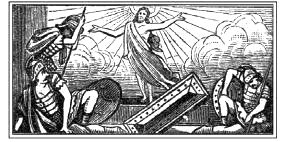
| Contents | Te gestientem gaudiis The Gladness of Thy Motherhood |
BVM |

Composed by Fr. Augustine Thomas Ricchini (1695-1779) in 1757, this hymn is used at second Vespers in the Roman Breviary and at Lauds and Vespers in the Liturgia Horarum for the Feast of the Most Holy Rosary (Oct. 7). It is the fourth of a series of four hymns for the feast. See the first hymn of the series, Caelestis aulae Nuntius, for historical details. This hymn summarizes the themes of the first three hymns, namely the Joyous, Sorrowful and Glorious Mysteries of the Rosary.
|
| TE gestientem gaudiis, te sauciam doloribus, te iugi amictam gloria, o Virgo Mater, pangimus. |
THE gladness of thy Motherhood, the anguish of thy suffering, the glory now that crowns thy brow, O Virgin Mother, we would sing. |
| Ave, redundans gaudio dum concipis, dum visitas; et edis, offers, invenis, Mater beata, Filium. |
Hail, blessed Mother, full of joy in thy consent, thy visit too; joy in the birth of Christ on earth, joy in Him lost and found anew. |
| Ave, dolens, et intimo in corde agonem, verbera, spinas crucemque Filii perpessa, princeps martyrum. |
Hail, sorrowing in His agony the blows, the thorns that pierced His brow; the heavy wood, the shameful Rood Yea! Queen and chief of Martyrs thou. |
| Ave, in triumphis Filii, in ignibus Paracliti, in regni honore et lumine, Regina fulgens gloria. |
Hail, in the triumph of thy Son, the quickening flames of Pentecost; shining a Queen in light serene, when all the world is tempest-tost. |
| Venite, gentes, carpite ex his rosas mysteriis, et pulchri amoris inclitae Matri coronas nectite. |
O come, ye nations, roses bring, culled from these mysteries divine, and for the Mother of your King with loving hands your chaplets twine. |
| Iesu, tibi sit gloria, qui natus es de Virgine, cum Patre, et almo Spiritu, in sempiterna saecula. |
All honor, laud, and glory be, O Jesu, Virgin-born to Thee; All glory, as is ever meet, To Father and to Paraclete. |
| Latin text from the Roman Breviary, translation by Abbot Oswald Hunter-Blair, abbot of Fort Augustus Abbey, Scotland (1853-1939). |
<- Prev |
Next-> |
